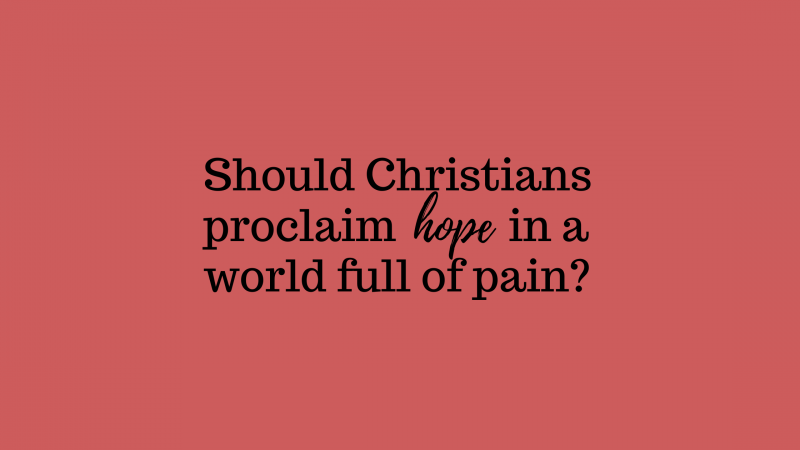“The hard parts of life rarely feel light and momentary.” My friend alluded to 2 Corinthians chapter 4. “Sometimes it’s tough reading that passage, knowing how heavy these ‘things that are seen’ really are.”
I didn’t understand the depth behind my friend’s words for some time. At the time of this conversation (many years ago), 2 Corinthians 4:17-18 was my favorite verse. It reads: “For this light momentary affliction is preparing for us an eternal weight of glory beyond all comparison, as we look not to the things that are seen but to the things that are unseen. For the things that are seen are transient, but the things that are unseen are eternal” (emphasis added).
My previous understanding of this verse was somewhat naive. Even with just a few extra years of life behind me, I’m much more aware that hopeful verses such as the one mentioned above rarely feel like enough. Often, they can be downright frustrating.
How on earth are we supposed to pay attention to the things we cannot see when we are so painfully aware of all that’s right in front of our face?
It feels impossible (and unwise)…
…to look past a dwindling bank account.
…to ignore the state of our mental health.
…to pretend that toxic relationships aren’t hurting us as much as we know they are.
However, this isn’t what Paul means when he says that we must “look not to the things that are seen” (2 Corinthians 4:17). Paul isn’t advocating for a “proclaim hope and dismiss the rest” ideology. His hopeful message is far more well-rounded, far more grounded in reality. So let’s talk about hope’s place in the life of a Christian.
Christian hope is not just a warm feeling that everything is going to be okay. Neither is it wishful thinking. Christian hope is certainty in what is to come. Regardless of our current situation, we know our future holds “an eternal weight of glory beyond all comparison” (2 Corinthians 4:17).
This reality does NOT dismiss our present situations or our present pain. It simply reminds us that there is more to being a Christian than what we see today. It reminds us that God’s promise of redemption and reconciliation is real. There will be a day with no more pain, no more tears, no more injustice, no more sin.
Paul’s reference to “light momentary affliction” is notable because the things Paul experienced were anything but light. He repeatedly endured imprisonments, beatings, and near-death experiences (2 Corinthians 11:23-33). Back in chapter 1, Paul wrote that he and Timothy “despaired of life itself” (2 Corinthians 1:8).
That last sentence may be worth reading again. We think of Paul, the apostle: strong, able, and courageous. But there is also this Paul, the apostle: the man who despaired of his very life.
Paul understood pain. He was not “above” it and he did not dismiss it. Yet his hope remained.
My friend was right in saying that what happens here on earth often feels far from momentary or light. I bet if we sat down for a conversation with the apostle Paul, he’d agree.
That said, I think reading 2 Corinthians 4:17-18 in the context of the whole book gives us a clearer picture into Paul’s message of hope. Paul’s hope is grounded in God’s past faithfulness, looks forward to the future fulfillment of God’s promises, and provides very real ramifications for today.
*****
Our hope is grounded in the past and looks forward to the future.
Just as Christ was raised from the dead and is seated at the right hand of the Father, Paul knows that a day is coming when we too will be raised up and brought into the presence of God. Sin will no longer exist as this ugly barrier between us and Him. And that feeling that God is distant or uncaring? No more. It’s at this time that we will experience “an eternal weight of glory beyond all comparison” (2 Corinthians 4:17).
Our hope has ramifications for today.
The promise of eternal glory would’ve “technically” been enough to give us hope. But it is God’s nature to interact with us, to offer comfort, to care for us today. The God of all comfort longs for a relationship with you. He longs for you to rely on Him, to trust Him—even (especially) in the midst of pain.
Paul holds onto hope because he knows that our God is the God of all comfort. Our Lord “comforts us in all our affliction, so that we may be able to comfort those in any affliction, with the comfort with which we ourselves are comforted by God” (2 Corinthians 1:4).
Implicit in this verse is the idea that God created us to be in community with other people. God himself is our ultimate source of stability and rest, but He also created us to lean on and receive comfort from the people that He’s placed in our lives. Through these people and God himself, we have tangible glimpses of the good that is to come.
All that to say, let’s hold on to hope as we face the challenges of this day, this week, this month—not the “wishful thinking” or ”ignore your pain” kind of hope, but the kind of hope that is grounded in the past, looks forward to the future, and has very real ramifications for today.





Oh Sam, You did it again…allowed the Spirit of God to work through you to encourage one who needed encouragement! Thank you!
I am so, so glad (and humbled that God chooses to encourage others through me). Love you!